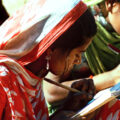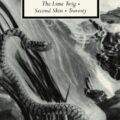Where There is Dust, There is Hope

At the half-way point of Kenya’s hotly-contested 2007 elections, the challenger Raila Odinga seemed poised to unseat President Mwai Kibaki. Odinga championed a host of Kenyan tribes who felt underrepresented by a government that, in their eyes, favored Kibaki’s own Kikuyu people. The results were counted over three days in December, as rumors of rigged votes spread across the country. The election commission declared the incumbent Kibaki as the victor, and he was swiftly sworn in despite Odinga’s objections and claims of fraud. Subsequent demonstrations transformed into ethnic violence and battles with the police. Protests led to fires that gutted homes, businesses, and churches. The wave of violence that rolled through cities such as Nairobi destroyed entire communities and devastated families. It is in the aftermath of this political unrest and sectarian violence that Yvonne Adhiambo Owuor stages her debut novel, Dust.
Dust reassembles the pieces of the Oganda family after its eldest son is killed in the post-election bloodshed. Travelling from Brazil to Kenya, Arabel Ajany Oganda has returned to help transport her brother’s body from Nairobi to the Oganda family home, a ranch called Wuoth Ogik. Once Odidi Oganda’s coffin is buried, Ajany takes off, leaving only a cryptic message for her father. “I’m…uh…looking for Odidi,” she explains to one of her brother’s former professors. She hangs posters that read, “My brother, Moses Ebewesit Odidi Oganda, is lost. Have you seen him?”
Ajany’s search runs parallel to that of an Englishman named Isaiah Bolton, who arrives at Wuoth Ogik seeking traces of his father, Hugh Bolton. Hugh disappeared decades earlier, just after Kenyan independence, and Isaiah was raised by his mother in England. After noticing an advertisement Isaiah published in a Nairobi paper, Odidi Oganda had sent him a book from the library at Wuoth Ogik that had the name “Hugh Bolton” inscribed on the inside cover.
Four historical events haunt the the Oganda house and compose the narrative present: World War II, Kenyan Independence, the 1969 assassination of a promising Kenyan politician named Tom Mboya, and the 2007 elections. Nyipir Oganda—Ajany and Odidi’s father—watched his own father and older brother leave Kenya to fight alongside other soldiers from the British empire in Burma (Myanmar) during World War II. They never returned, and as a result Nyipir becomes a cattle herder and gun-runner. He imagines this work to be the means to an end: financing a search for his father and brother. Burma lingers at the edge of Nyipir’s imagination. He meets a young Hugh Bolton and works as the Englishman’s aide, until Bolton vanishes. Nyipir assumes ownership of his house, Wuoth Ogik, and the affections of the Kenyan woman, Akai, who had been in love with Hugh.
Kenya achieved independence in 1963, after forty-three years as a British colony. Many Europeans fled the country. Some stayed. Hugh Bolton simply disappeared. Only Nyipir and Akai Oganda would know why. Nyipir went to work for the new government, becoming an officer in the Anti-Stock Theft Police Unit. The job provided cover for him to smuggle guns in the boxes of dates and salt loaded onto the backs of livestock. He became a husband and father as Kenya was united under a Kikuyu president. Then in 1969 a young politician named Tom Mboya—who seemed destined to become Kenya’s next great leader—is gunned down. The perpetrator responds to interrogation by suggesting a political conspiracy at the highest levels of government. Men like Nyipir are then brought to the President’s house to swear secret oaths of loyalty to their fellow Kikuyus.
The presidential election of 1969 became, essentially, a one-party contest with Mboya out of the picture, and the predominantly Kikuyu Kenya African National Union party remained in power until 2002. In the elections that year, the National Rainbow Coalition rose to power under the leadership of Mwai Kibaki. The winds of tribal tension shifted for the first time since independence. Following nearly four decades of anxious marginalization, perhaps the Luos couldn’t bear the idea of relinquishing power after only five years. This anxiety, and the circumstances around the election, lead to the violence of 2007 that plagues the peripheries of Dust. The riots become the convenient cover-up for a complex series of events that leads to Odidi’s death.
Isaiah arrives too late to meet Odidi, but he develops a fraught relationship with Ajany, following her to Nairobi and attempting to append his search to hers. The post-election violence cools under a temporary peace and a tense postcolonial pulse runs between Isaiah and Ajany—one underscored with violence, sex, and grudging respect. When he comes to her room one night, they physically fight: “He could hurt her. Hands squeeze her neck and arm. She bites him.” But they also, perhaps too predictably, fall in love—a convenient deus ex machina for the horrifying reality of sexual violence that echoes with political and racial domination.
Owuor twines these searches together, tightening the lines into a single braid. Isaiah’s search for his father merges with Ajany’s search for Odidi, and each becomes a metonym of Kenyan history: colonial independence on one hand; the struggle for free, democratic elections on the other. Absence ultimately drives the narrative. Gaps and erasures riddle the novel. Some are filled out; others remain. What is it that happens in these vacant spaces? What is time emptied of its content?
Owuor’s narrator fills the absences by naming them, frequently deploying the words “Later” and “Silence.” She calls attention to the gaps as meaningful in themselves. They are just as important as the events and entities that constitute the story. Like the stars that comprise a constellation, the novel’s conflicts must be understood in their relation to one another across vast spaces and through the impassable nature of those distances. The constellation Kormamaddo gives celestial shape to absences filled with longing in the novel, and the astral camel serves as a guide at pivotal moments in a searcher’s quest: “Ajany scans black spaces between stars. She finds Kormamaddo, the bull camel of the waters, Odidi’s sky marker.” The emptiness allows for shape, for higher forms of truth than personal experience, just as the mystery of Odidi allows Ajany to see the true outline of her brother for the first time.
The characters, however, each represent a single point of light, unable to see the larger constellation. Only the author and her readers, with enough distance, comprehend them. Still, the intricacies of the narrative, particularly in its historical grounding, suggest even larger forms. The novel does not encompass Kenyan history, or allegorize. Owuor challenges any attempt to construct a tidy version of the country’s history, shaped as it is by colonialism, revolution, corruption, and indefatigable hope.
The author spends as much effort adding layers to the lives of her characters, even of minor figures, as she does portraying the circuit of history and narrative. Owuor succeeds in crafting intricate characters without allowing for their stories to become tiresome. These techniques also place the two protagonists along a continuum with the other characters. It is only after delving into the lives of a few corrupt officials, for instance, that Owuor finally fleshes out Akai’s history.
Like Owuor’s Caine Prize-winning story “Weight of Whispers,” Dust follows characters who set out to rebuild something for themselves in the wake of tragedy. In that story, Owuor tells of a young Rwandan named Boniface Louis Kuseremane, who flees the ethnic violence of his home country for Europe but gets stuck in Kenya. Examining government corruption and the depths of Bon-Bon’s despair, Owuor tests the limits of Ecclesiastical verse: “For what hath man of all his labor, and of the vexation of his heart, wherein he hath labored under the sun? For all his days are sorrows, and his travail grief; yea, his heart taketh not rest in the night. This is also vanity.” Bon-Bon’s family scatters, but he remains in Kenya to look after the graves of his sister and mother.
Dust concludes with a more hopeful scattering of family. Owuor renders the characters of her novel in a prose that mirrors the intricate arrangements of their lives. The music comes alive at the novel’s end: “Her eyes contained the shine that marked those who emerge out of chasms. It took an eternity before he answered. Dripping water, he asked if this was the road that led to the place where journeys ended.” Dust is a long journey, but its end is well worth the wait.
About Matt Mullins
Matthew Mullins is assistant professor of English and History of Ideas at Southeastern Baptist Theological Seminary. He has published literary criticism in a variety of academic journals, and he tweets at @MullinsMattR.




